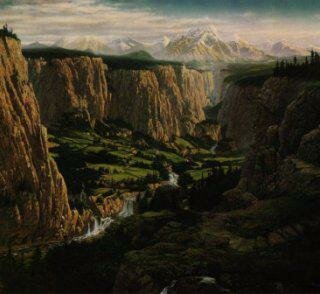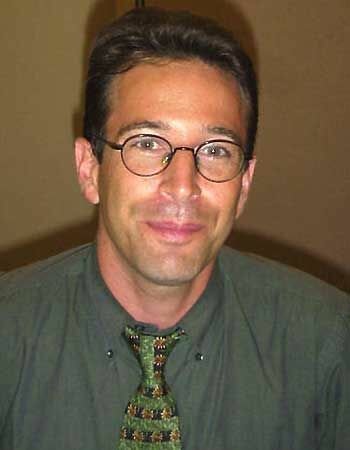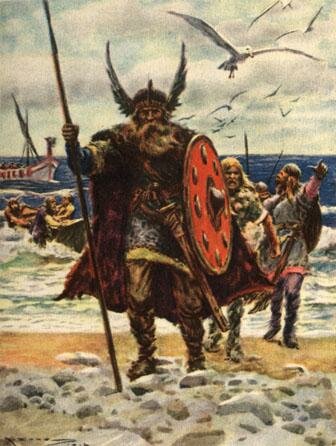Top 10 Most Desired Places after Death
Suggested by SMSWhile Ancient Greeks dreamed of romantic fields of serenity and others yearn for the birth place of a child as the place they would like to reside after death, the idea of facing this event over and over for all eternity could take the luster from it. It’s more likely we would like to experience the joy of it again and then move on to more enduring locations of peace and beauty.
These places are the ones that have been described by religions, mythologies and comforting parents over the years. They are usually places of tranquility and hope, free from hardship and the trials of our mortal lives.
However, each has its own character and special features, often reflecting the culture that created them. So the list following, working from the tenth most desired to the most sought after, are the places we would like to rest in after Death.
10. Elysian Fields: Roman & Greek Mythology
The Elysian Fields, or Elysium, were originally the home and sanctuary of the Gods. There they were able to share eternity, both heroes and mortals to whom the Gods were related. In time, although some feel there is no time in the afterlife, the entry criteria was extended to include those selected by the Gods for the righteous life or heroic deeds.
Nestled cozily on the banks of the Oceanus River, the Elysian Fields are understood to be at the end of the Earth. However, there was speculation that it was on the Fortune Islands or the Islands of the Blessed, located in the western ocean.
To reach the land of peacefulness and beauty, one had to cross the River Styx. This journey involved being ferried across by Charon, the Boatman, and then facing judgment in Underworld; the final decision on the specific part of Underworld in which the soul was to reside for eternity would be made by the judges and gods.
Interestingly, there is little description of the physical beauty of the Elysian Fields other than the presence of pale liliaceous asphodel and poplars. However, there is much greater interest shown in the potential to share ideas and conversations with the other heroic and brilliant residents. This may be a telling statement on the aspects of life that was valued most highly by the Greeks and Romans.
9. Asgard: Norse Mythology
To gain access to Asgard, more is required than a good death and a nod from a boatman. The only path, except for rare exceptions, is over Bifrost, the Rainbow Bridge, which is over seen by the god, Heimdall. Bifrost isn’t a permanent feature, only being produced from a crag on the wall of great world.
The wall of Asgard, although partially damaged, is a reflection of the nature of the Norse culture. It was created to protect the Aesir in their armed camp that arose after a war between them and the Vanir, another race of Norse mythology. With such defenses, Asgard became a place where the Gods of Aesir could live in peace, undisturbed by the attacks of other jealous races.
Even the tales of Asgard’s creation are often about treachery and deceit. Parts of the world are created from the bones of other gods and even the builder of the amazing world was killed and transformed into a landmark. While there are some rolling hills and a majestic mountain range, the largest space in the whole of Asgard shows no sign of growth or habitat as the plain of Vigrid is saved as a battlefield for the future.
The most famous city of Asgard, as there are a number of them, is Valhalla. The eternal home of the Einherjar, Valhalla was often the sought after destination for many soldiers and Norse warriors. That is because the Einherjar were those particularly heroic souls who died in battle and were chosen by Odin for special honor.
While many people of this culture had to accept that they would probably never be invited to the world of Asgard, it was still a dream of most that the Gods would see them as noble, honorable and Asgard-kind-of-people.
8. Avalon: Celtic Mythology
The sacred “Otherworld” of Avalon is a wonderful blend of the unknown and the unknowable. A more sophisticated form of the afterlife, Avalon cannot be called a “land” as it does not exist in any context of the mortal realm and the passage to it is as mysterious as the enchanted place itself.
Avalon is beyond the confines of space and time, sometimes described as in the “cracks of everyday life”. However, the beautiful magic of such belief could not last forever and eventually people tried to place Avalon within a sense of their understanding. Some described it as an island, others as somewhere on the other side of the world and most notably it was the resting place of King Arthur where he would be healed and one day return to his people.
Despite the attempts to drag it back to our world, Avalon remains the model of peace and cosmic order. In a dimension that we are yet to experience the true meaning of beauty, power and wisdom are recognized by those fortunate enough to find their way there.
In Celtic traditions, Avalon translates to an “island or place of apples” and the apple is known as an image of paradise in many cultures. Whether the Tree of Life, which is eternally tended by priestess guardians, is seen as an apple tree or a unique tree only found in this paradise, it is one of the few features of Avalon that can be discussed in terms that mortals comprehend.
The path to Avalon is as enigmatic as the place itself. It could be very close, yet could be far from where we now stand. Like much of its mystery, Avalon’s entrance presents to those it will in a form that only they will know.
7. Summerland: Wiccan Beliefs
While it may well sound like a holiday camp on the south coast of England, Summerland is actually of great significance to those of Wiccan beliefs. Where it is sometimes referred to as a final destination in the afterlife, it is also a highly important link in the process of learning and spiritual development.
In the scheme of life, death and reincarnation, Summerland holds the status of being the place of recovery, reflection and rebirth. Believers of Wiccan don’t recognize a hell, devil or equivalent bad-guy. They believe that we are constantly moving towards our final incarnation and the time spent in Summerland is time to consider the mistakes that we made in our most recent life, so that we can learn from them and be better people in the next.
The common vision of Summerland is one of wonderful, rolling green fields with beauty at every turn. Majestic and picturesque trees abound and the sky is a typically summer blue. Although this image is a little idyllic, it is worth remembering that this is a place designed to be pleasing and welcoming. Presence in it is never a punishment, just as death isn’t a bad thing. They are simply a stage in the process.
When the Wiccan has experienced enough incarnations and has died for the last time, they are welcomed to Summerland and offered four choices. The first is to return to Earth and begin the incarnation process again. The second is to return to Earth, but in the form of another species. Thirdly, they can put their feet up and remain in Summerland forever. Finally, they can choose to share their learning with others and become a spirit guide, angel or elemental; whatever the choice of the Wiccan religion, the desire to reach Summerland remains the driving force in the cycle of birth, death and reincarnation.
6. “Olam Ha-Ba” or World to Come:
Where many cultures have names for their eternal home, Judaism simply calls it the “World To Come” or “Olam Ha-Ba”. This may be a reflection of the Jewish attitude that focusses more on the life here and now than on life beyond death. It’s also notable that the term “Olam Ha-Ba” doesn’t appear in the Jewish Bible.
Moreover, the tradition of Judaism sees death as a transition rather than an ending. Such a disinterest in the passage to Olam Ha-Ba is illustrated by the right of Orthodox Jews to believe any scenario they choose for the step following death. It is conceivable that they could believe that their soul will wait for the coming of the messiah and resurrection, that the righteous move on immediately to a heaven-like environment that they may even be reincarnated over and over again or any other version of the story.
Similarly, the actual nature of Olam Ha-Ba is often left undefined. There are opinions that describe an idyllic world for the righteous, but others consider that it is a completely spiritual existence that rejoices in freedom from the physical body. One reference explains that all physical needs are void in Olam Ha-Ba and that the righteous simply bask in the glory of Shekhinah or “Divine Presence”.
However it is defined, however it is accessed and however it is spoken of in Judaism, Olam Ha-Ba has a special appeal in that it allows individuals to remain within a structured and secure religion, while enjoying the freedom to see the afterlife in a way that satisfies their needs and expectations.
5. Aaru: Reed Fields Egyptian Mythology
The Egyptians would seem to have been a little more focused on death than many other cultures. Where some civilizations would dig a hole or light a fire at the time of death, the Egyptians spent years building monumental tombs to their kings. These have lasted millennia and the fascination of the pyramids still enchants people today.
After death the soul was believed to travel to Duat, a world infested with demons and creatures that could destroy the newly arrived soul. On successfully negotiating a passage through Duat, the soul was met by Anubis, the God of the Dead. Using a feather that had belonged to Ma’at, the Goddess of Justice and Truth, the heart of the deceased person was weighed against it.
If the feather was heavier than the heart of the deceased person, then they could progress through a long and difficult journey to Aaru. But if the heart was heavier, the heart was fed to Aamit, the devourer.
On reaching Aaru, the soul was met with pleasures, such as perfect hunting grounds and abundant fishing fields. They could continue the work of their life, but without the need to sell and trade. They could engage in the same hobbies and pass-times that gave them pleasure on Earth. All of this was possible, but without those things that brought them unhappiness.
Aaru was recognized as a place of abundance, not unlike the Nile Delta. So it follows that it was seen a place rich in reeds and the features that the Egyptians could identify as common with the most fertile part of the great river.
4. Moksha: Hinduism
Reincarnation is one of the most common structures in theories of the transition to an afterlife. The principle sees this life as a progression of lessons and tests that will be used to decide our place in the next incarnation. There is a sense of judgment and some omniscient being then decides where we will be best placed to learn more and continue to a state of perfect fulfillment.
Hinduism uses many parts of this model with Karma being the currency of our deeds. Righteous and generous acts gain good Karma, unjust and mean acts incur bad Karma. The followers of Hinduism see that they must deal with the repercussions of their behavior in this life or the next and they understand that death is a central part of the process. This is the time to tally up the Karma and review the data.
The continuing hope is that the cycles will come to an end and that the soul will reach Moshka. Yet, there are differing views on the nature of Moshka with one being that it is a state in which we are released from the illusion of life. We are freed from the falsehood of the “self” and we are able to recognize the truth of existence.
Another opinion is that Moshka is simply a union with God that is eternal and purely loving. We will maintain our personality and those things that make us who we are while gaining access to a relationship with God that is full and complete.
It is interesting that in the pursuit of the state of Moshka, the idea of Paradise is seen as a distraction from the greater purpose. Recognized as having attraction of some temporal nature, Paradise is to be avoided as it takes us away from the greater goal of Moshka.
3. Nirvana: Buddhism
Much of western society has the need to define the concept of Nirvana in terms of a physical heaven or a state that has heavenly qualities, but the truth of the nature of Nirvana is beyond physical comparison and even the Buddha could not articulate it in words. Most importantly it is the state Buddhists reach that brings to an end the process of life, death and reincarnation.
Recognized during his enlightenment, the Buddha acknowledged that Nirvana, which translates to mean unbinding, was a state in which he was no longer engaged in desire, ignorance or jealousy. He was able to conquer these destructive distractions and gain a true state of bliss. At this point, the karmic debt is resolved and the work of life is complete.
Although pressed to give details of the “place” of Nirvana, the Buddha declined to even attempt to put it in words. Perhaps this was because there was physical context that was capable of expressing the beauty of a state free of the material bindings of life. His desire to avoid such descriptions was perhaps his teaching that to reach Nirvana we must step beyond our worldly experience.
2. Janna: Islam
The nature of Janna or Paradise in the Islamic tradition is described in terms that appeal to the common man. It tells of rivers of water, wine and milk that are never sullied and run continuously. It promises that the inhabitants will wear silken garments laced with jewels and they will enjoy the sunshine and rest in the shade.
But there is another aspect to Janna that is important to include in the description. For although there is a physical experience to this eternal place of beauty, there is also a spiritual consciousness that can only be described as “things that no eyes have ever seen, nor ears have ever heard”. This steps beyond the recognizable physical world that we know and introduces concepts of bliss and contentment that are beyond the realm of everyday life.
To gain access to Janna there are some that say that Muslims must remain believers throughout their lives and that they must die as Muslims. Yet, there are more definitive requirements that may be more helpful explaining that Muslims must believe in God and his messengers and lead a good life on Earth.
Janna is said to have eight gates on its boundaries and each of these levels is divided into one hundred degrees. The highest level is firdaws and, just as Janna is a shortened form of the Arabic word for “garden”, firdaws is sometimes referred to as “Eden”. The first to enter this level will be Muhammad, followed by those that lived in poverty and then the devout. As they enter they will be greeted by angels and they will live without shame, fear, hurt or any form of sorrow. Every wish will be fulfilled.
1. Heaven: Christianity
A major issue of a religion that has so many variations and factions is the difficulty in finding a consistent description of Heaven. There are some Christians who believe that Heaven is the throne room of God, where angels play harps and all bask in the glory of the Creator. Others recognize that Heaven is a place without physical context and the inhabitants enjoy an eternal experience of bliss and contentedness in a purely spiritual sense.
The Christian Bible speaks, in the vernacular of the time of its writing, of the Kingdom of Heaven and Christ spoke of His Father’s “house” having many rooms. Eastern Orthodox Christians perceive Heaven as having different levels, with the Paradise of the Garden of Eden being the lowest that touched the Earth.
Most Christian traditions recognize that the path to Heaven is one where the judgment of God determines the suitability of the soul to travel forth. However, just as some Christian Rites include the sacrament of Reconciliation, which provides believers with the opportunity to be forgiven for their sins, the road to Heaven also has a second-chance clause.
Should a soul be deemed unworthy of a place in Heaven on first application, it can be sent to the state of Purgatory. There the soul will spend time in prayer and working to find the path to righteousness. In fact, it is common that those still on Earth will pray for the souls in Purgatory to see their sentence reduced. This practice led to monks in the middle ages making a substantial living by praying for the souls of Kings and Nobles who had caused the death of men in war. The monks would charge the heirs of these leaders for the time it took for the monks to pray for their souls.
Heaven may be a land of milk and honey, paved with gold and devoted to the adoration of God. Or it could be a state of consciousness beyond all worldly comforts where the love of God envelopes and comforts the faithful soul. Whatever the truth, it is, like most “here after’s”, are places that provides hope and courage to the lives of those on Earth.




















[...] https://akorra.com/2012/07/26/top-10-most-desired-places-after-death/ [...]
[...] https://akorra.com/2012/07/26/top-10-most-desired-places-after-death/ [...]
[…] Source […]